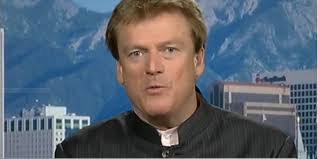For reasons that will eventually become clear, in early 2005 I began to believe that the SEC was behaving oddly, that is, in a manner inconsistent with its duties as a regulator. By the summer of 2005 I began publicly stating two hypotheses for this behavior. The first was that the SEC had been captured; I will explain the second in Deep Capture’s Chapter 7, “Unsettled Trades and Systemic Risk“.
Shortly after I started raising the possibility of the SEC’s capture, an SEC Senior Investigator named Gary Aguirre began echoing it, first in a September, 2005 letter to SEC Chairman Christopher Cox, and then in May 2006 in asecond letter to the United States Senate. Mr. Aguirre has informed me that he wrote that first letter to Chairman Cox without knowledge of my own public statements, which preceded his by a month only.
The proximate cause of Aguirre’s complaint was that an insider trading investigation he had been conducting into the activities of Pequot Capital, a powerful Connecticut hedge fund, was derailed (he claimed) once the trail led towards John Mack, the influential boss of Morgan Stanley. Mr. Aguirre claimed that his SEC bosses had maneuvered to kill his investigation while warning Aguirre that Mr. Mack had too much “juice” to pursue.
The more general theme of Mr. Aguirre’s letter, however, was the capture of the SEC by lawbreakers to the detriment of law-followers. As former SEC Senior Investigator Aguirre wrote to the United States Senate:
“…is the SEC adequately protecting the nation’s capital markets and their participants from the risk of manipulation and fraud by the nation’s 11,500 hedge funds? The answer is no.
“And the answer is no whatever facts you consider. It is no when the SEC fails to recognize any hedge fund fraud or manipulation against other market participants for a quarter century: from 1979 to 2004. It is no when the SEC fails to protect mutual fund investors when billions of dollars are siphoned from their accounts by hedge funds. It is no when you compare what the SEC is doing and saying about hedge funds with what its counterparts in Europe are doing and saying….It is a deafening no when the SEC halts an insider trading investigation of one of the nation’s largest hedge funds because the suspected tipper has powerful political connections, as they did with the investigation assigned to me…
“I believe our capital markets face growing risk from lightly or unregulated hedge funds just as our markets did in the 1920s from unregulated pools of money – then called syndicates, trusts or pools. Those unregulated pools were instrumental in delivering the 1929 Crash…. There is growing evidence that today’s pools-hedge funds-have advanced and refined the practice of manipulating and cheating other market participants…
“Fixing the SEC so it can protect investors and capital markets from hedge fund abuse will not be an easy task. Powerful interests want the SEC to stay just the way it is or, better yet, to become even weaker. Those interests are not just the hedge funds. They include the financial industries that are receiving tens of billions of dollars in revenues for helping hedge funds cheat other market participants or close their eyes to the carnage. At the top of that list are the big investment banks, e.g., Goldman Sachs, Morgan Stanley, Merrill Lynch and Bear Stearns. Those interests know how to reward friends and punish perceived enemies. Their tentacles reach far. They stopped the hedge fund investigation I was assigned to conduct. They cost me my job.”
It would be difficult to devise a more eloquent statement of regulatory capture, or one more informed by experience, than this letter from SEC Senior-Investigator-turned-whistle-blower Gary Aguirre.
In June 2006, Mr. Aguirre was asked to testify before the U.S. Senate Judiciary Committee, to which he had delivered boxes of evidence (which he apparently carried out of the SEC). The U.S. Senate Judiciary Committee began demanding answers of the SEC. The SEC stalled while threatening criminal charges against Aguirre for his whistle-blowing, prompting U.S. Senator Charles Grassley to write in August a remarkable letter lecturing the SEC on congressional oversight and the U.S. Constitution.
In September 2006, the Senate wrote two letters pressing the General Accounting Office to conduct a formal investigation into Aguirre’s allegations of regulatory capture and the overall regulatory framework of our country’s capital markets (see here and here).
In October 2006, Gretchen Morgenson and Walter Bodganich of The New York Times began to report on the serious implications of this story. Their reporting was able, and took Mr. Aguirre’s allegations seriously.
On December 5, 2006, however, New York Times reporter Floyd Norris wrote a story that was dismissive of Mr. Aguirre’s allegations and derisive towards his motives (“Get a Job, then Sue Because You Were Not Hired Earlier”). Reporter Norris included no quote from Mr. Aguirre and precisely one sentence (“He contends that the S.E.C. was unwilling to go after John Mack, now the chief executive of Morgan Stanley, because of his political clout”) that reflected Aguirre’s position. Norris made no mention of Aguirre’s deeper claims about the capture of the SEC by “Powerful interests [which] want the SEC to stay just the way it is or, better yet, to become even weaker,” nor about its failure “to recognize any hedge fund fraud or manipulation against other market participants for a quarter century,” nor about the systemic risk thereby engendered (we will see that such omissions occur with remarkable consistency in our mainstream financial press).
However, Norris did find space to give liberal coverage to the SEC’s position , including an SEC statement denying Aguirre’s claims, the SEC’s reasons for that denial, the position of SEC Enforcement Director Linda Thomsen reaffirming the SEC’s position, the same from an EEOC judge, two rhetorical questions aimed at deriding Mr. Aguirre’s actions, and a quote from an SEC lawyer attacking Aguirre. Mr. Norris closed by saying of that attack by the SEC’s own lawyer, “It certainly sounds as if that opinion was (sic) correct.”
Such was the impartial approach taken by “our newspaper of record.”
This mocking and derisive piece appeared on The New York Times on the day that Gary Aguirre testified at a US Senate hearing. The U.S. Senate Judiciary Committee took Mr. Aguirre’s testimony (see parts 1 and 2). Several SEC officials appeared to refute Mr. Aguirre’s claims (click here). Giving testimony that drew sharp replies from the U.S. Senate Judiciary Committee members, these SEC officials contradicted each other and their own email records. The Inspector General of the SEC refused to answer questions on the advice, he said, of the U.S. Department of Justice.
Read that again: our capital markets are regulated by the SEC, and the Inspector General of the SEC, in effect, its “Internal Affairs” department, invoked the 5th Amendment’s protection against self-incrimination.
Is that bad?
When The Wall Street Journal played its normal and customary role of downplaying these events on the behalf of Wall Street, it drew a public letter from Senator Grassley rebuking them for outright misdirection.
In January 2007, the Senate released a preliminary report. Marcy Gordon of AP News summarized it:
“an official review raises serious questions about the Securities and Exchange Commission’s handling of an insider-trading investigation and the possibility of a cover-up amid allegations of political interference….After taking testimony and reviewing thousands of documents, many of them provided by the SEC, the judiciary panel’s preliminary findings show ‘extraordinarily lax enforcement by the SEC and … may even indicate a cover-up by the SEC,’ [Senator Arlen] Specter said. The SEC’s handling of the matter, including a review of the attorney’s allegations by the agency’s inspector general, ‘has all of the earmarks of the obstruction of justice’, he said.”
Again, when a United States senator, highly respected by both parties, suggests that the regulator of the capital markets has taken part in a cover-up and the obstruction of justice, is that bad?
In March 2007, Mr. Aguirre’s allegations were covered sympathetically in a PBS news story which was later nominated for an Emmy for investigative journalism.
In August 2007, the final report was released under the imprimatur of the Committee on Finance of the U. S. Senate. A good summary of the report can be found in this Reuters story.
The Senate’s report stated the following conclusions (emphases in the original):
“Staff Attorney Gary Aguirre said that his supervisor warned him that it would be difficult to obtain approval for a subpoena of John Mack due to his ‘very powerful political connections.’ Aguirre’s claim is corroborated by internal SEC emails, including one from his supervisor, Robert Hanson. Hanson also told Aguirre that Mack’s counsel would have ‘juice,’ meaning they could directly contact the Director or an Associate Director of Enforcement.
“SEC management delayed Mack’s testimony for over a year, until days after the statute of limitations expired. After Aguirre complained about his supervisor’s reference to Mack’s ‘political clout,’ SEC management offered conflicting and shifting explanations.
“The SEC fired Gary Aguirre after he reported his supervisor’s comments about Mack’s ‘political connections,’ despite positive performance reviews and a merit pay raise.
“After being contacted by a friend in early September 2005, Associate Director Paul Berger authorized the friend to mention his interest in a job with Debevoise & Plimpton. Although that was the same firm that contacted the SEC for information about John Mack’s exposure in the Pequot investigation, Berger did not immediately recuse himself from the Pequot probe. Berger ultimately left the SEC to join Debevoise & Plimpton. When initially questioned, Berger’s answers concerning his employment search were less than forthcoming.
“The SEC’s Office of Inspector General failed to conduct a serious, credible investigation of Aguirre’s claims.”
The conclusion of the Senate report (page 104) expands on this point regarding the Office of the Inspector General, that part of the SEC tasked with preventing precisely the regulatory capture implicated in these events:
“The OIG investigation into Aguirre’s allegations was flawed from the beginning and hindered by missteps during the entire process. Every step seems to have been based on a desire to go through the motions and close the case. How the OIG could assess Aguirre’s credibility without ever speaking to him remains a mystery. One of the major problems with the OIG seems to be the perception within the SEC regarding the independence of the office and whether or not employees who approach the OIG are treated fairly. We interviewed a number of current and former SEC employees who indicated that the OIG is not well respected and that there is a general reluctance to approach the OIG with concerns. Aguirre was no exception…. Based on our review, the OIG at the SEC seems to have failed in its mission. Other SEC employees perceive it as a tool of management, used for retaliatory investigations against disfavored staff.”
The New York Times summarized all of this in a story with the tepid headline, “S. E. C. Erred on Pequot.” Indeed, if derailing investigations into wealthy elites with “juice” while negotiating high-flying jobs with their white shoe law firms as an Inspector General conducts a half-hearted investigation before whitewashing the cover-up-firing of an investigator too recalcitrant to go along for the ride all count as “erring”, then yes, The New York Times is correct, the SEC “erred” here.
In late July, 2007, SEC Chief Economist Chester Spatt resigned suddenly.
The U.S. Senate report was released on August 3, 2007. That afternoon, Walter Stachnik, Inspector General of the SEC, also resigned (according to this Forbes story, he had held that position since its creation in 1989).
The following Thursday, August 9, 2007, SEC Commission Roel Campos resigned as well.
That same day news leaked of the impending resignation of a second commissioner, Annette Nazareth (who, as we shall see later, is via marriage directly linked to the issue whose exposure is the ultimate purpose of this blog: unsettled trades in our settlement system).
The SEC is overseen by seven people: a Chief Economist, an Inspector General, and five commissioners. Of them, the Chief Economist, the Inspector General, and two of the five commissioners resigned within a three week period surrounding the August 3, 2007 publication of a report by the Senate Judiciary Committee of its investigation into the political capture of the SEC. I do not know the degree to which that constellation of facts is meaningful, nor do I wish to disparage any individual’s record of public service. Yet I trust that at this point my statement, “The SEC, regulator of our nation’s capital markets, has been at least partially captured by financial elites,” is a claim the merit of which the reader will now consider.
Because Mr. Aguirre was thoroughly vindicated by an investigation of the United States Senate, I thought it would be interesting to know how Floyd Norris of The New York Times felt about the hatchet job he had written on Mr. Aguirre. Given that by blowing the whistle on his former employer Aguirre had risked fortune, reputation, and perhaps even his freedom, surely a thoughtful, fair-minded journalist at “our newspaper of record” would welcome the opportunity to reflect on his mocking and derisive attack on Aguirre. So I wrote Mr. Norris a short note that contained a link to his December 5, 2006 story, and the simple question, “How do you feel about this piece now?”
The response I received from Mr. Norris was instructive:
“I have read our story on the Senate report, but not the report itself, and that does not change my opinion on Mr. Aguirre. I did not conclude in the blog that he was or was not fired for illegitimate reasons. The Senate thinks he was, judging by the article. The blog item remains accurate, to the best of my knowledge.”
Another New York Times reader emailed Mr. Norris a similar question, and forwarded to me the short response Mr. Norris sent him:
“And what, precisely did I write about Aguirre that was wrong?”
That is, concerning his own piece lambasting a tiny section of Mr. Aguirre’s position while ignoring all of its crucial elements, and which confined itself to parroting criticisms of him by the SEC, its director of enforcement, and its lawyer, and asking derisive rhetorical questions about Aguirre, and which then ended with Mr. Norris opining that, “It certainly sounds as if [such criticism] was correct,” now, in the face of a Senate report vindicating Aguirre and triggering the disintegration of the highest echelon of the SEC, New York Times senior reporter Floyd Norris can bring himself to express neither remorse nor contrition. Please stick another pin in this as an expression of the standards of journalism evinced by our financial media in general and “our newspaper of record” in particular, for it is a topic to which I shall have cause to return.
In any case, if I may assume that the reader judges my claim regarding the regulatory capture of the SEC to be worthy of at least modest consideration, then I may in good conscience turn to another aspect of that alarm raised to the United States Senate by erstwhile SEC Senior Investigator Aguirre:
“I believe our capital markets face growing risk from lightly or unregulated hedge funds just as our markets did in the 1920s from unregulated pools of money – then called syndicates, trusts or pools. Those unregulated pools were instrumental in delivering the 1929 Crash…. There is growing evidence that today’s pools-hedge funds-have advanced and refined the practice of manipulating and cheating other market participants …”





The concept of deep capture seems to have a fair amount of over lap with Noam Chompky’s “Manufacture of Consent”
Movie —> Manufacturing Consent 168 minutes
http://video.google.com/videoplay?docid=-5631882395226827730
Book at amazon —> Manufacturing Consent
http://www.amazon.com/Manufacturing-Consent-Political-Economy-Media/dp/0375714499/ref=sr_1_1?ie=UTF8&s=books&qid=1224132224&sr=1-1
Not bad… Not bad.
http://www.portfolio.com/news-markets/top-5/2008/12/10/Samberg-Pequot-Zilkha-Mack#page1